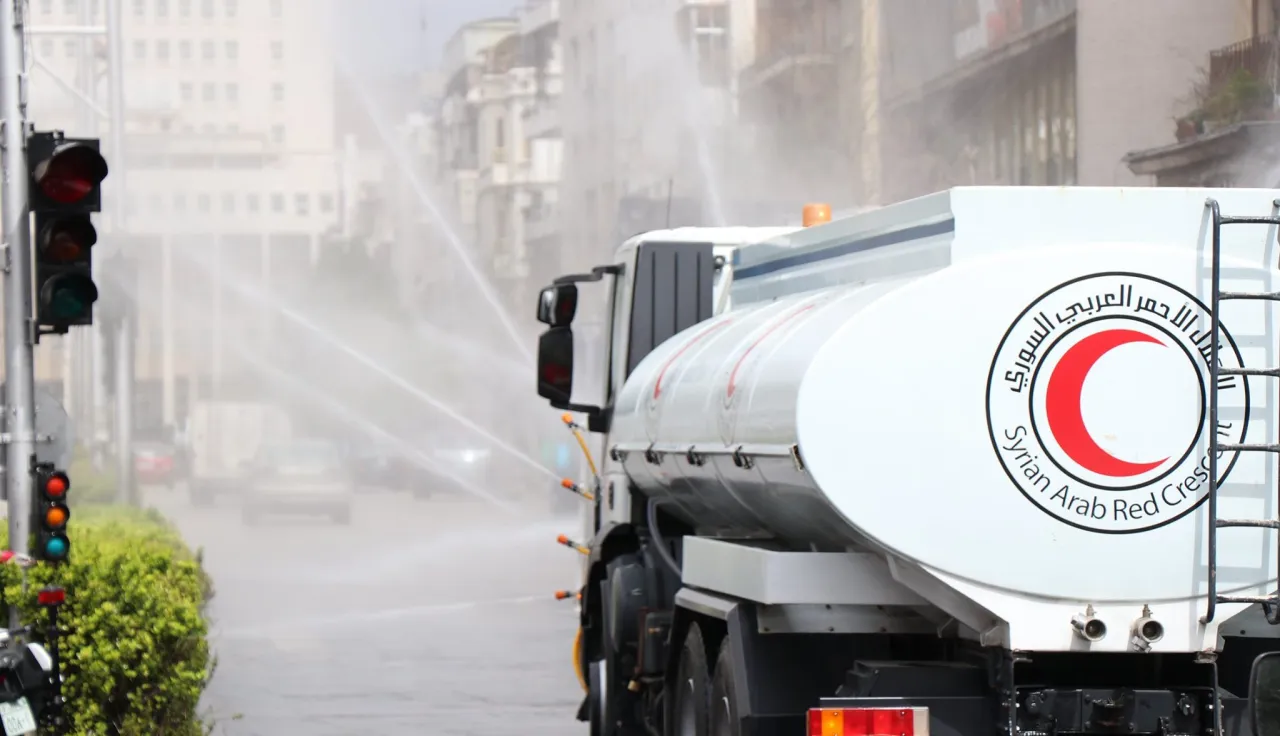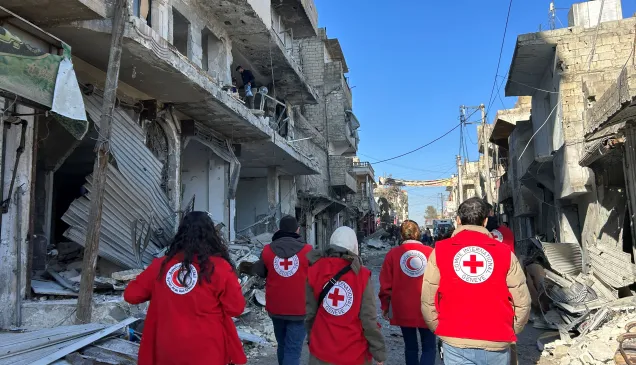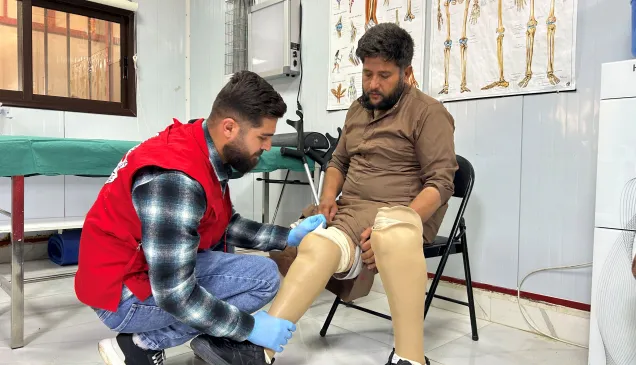COVID-19 in Syria: ICRC continues assisting millions and adapts to combat the virus

As Syria enters its tenth year of conflict, everyone is facing a mostly invisible threat.
The ICRC's largest operation continues to help millions of Syrians to maintain basic living conditions and has adapted its operations to help to protect the most vulnerable groups such as the displaced and the detained from the COVID-19 pandemic.
After weeks of heightened alert and the introduction of the first measures to curb the spread of the COVID-19 pandemic in Syria, the country had its first officially confirmed case of the virus on 22 March 2020, followed by the first COVID-19 death on 29 March 2020. Over the second half of March, measures restricting assembly and movement were successively tightened, and by early April, the country was put under a partial lockdown.
This global pandemic reaches Syria at a time when the country enters the tenth year of destructive conflict that has led to mass population displacement, and a once strong health system in a precarious state. Half of all health facilities are now out of service or partially functioning. The country has experienced an economic decline as a consequence of the conflict, sanctions, and a regional downturn generating further hardship for many vulnerable Syrians.
- 1 fully functioning hospital.
- Sporadic water shortages.
- Families displaced repeatedly.
How can millions in north east Syria cope with fighting, destroyed infrastructure, and COVID-19? https://t.co/3MPmmnXSty pic.twitter.com/5Rv31UbfGN— ICRC (@ICRC) May 23, 2020
Although a large part of the country has seen an increase in stability over the last year, there are still areas of active hostilities where particularly difficult living conditions exist. This is the case for the area in and around Idlib, where a million people have been displaced over the past months. In the North East of the country, an estimated 100,000 people live in camps. Millions of displaced people in other parts of the country are experiencing similar conditions.
People displaced by conflict are particularly vulnerable to health complications. The temporary accommodation and camps are crowded with often inadequate sanitation and shelter as well as little access to medical care and adequate nutrition. Those held in places of detention are another group that needs particular attention.
ICRC’s operation in Syria is its largest globally. Our operations have been a life-line for millions of Syrians over the last nine years. We continue to adapt and strengthen our programs, together with our operational partner, the Syrian Arab Red Crescent Society (SARC), to both maintain a broad range of life-saving activities and develop specific responses towards preventing or mitigating the spread of COVID-19 in this fragile environment.
Our large-scale programmes in the fields of water and habitat, health, economic security, and humanitarian protection, continue to not only address conflict-related needs but due to their focus on particularly vulnerable communities, play a significant role in improving the sanitation, nutrition and health status of millions of people in Syria as they face the COVID-19 pandemic.
This is how we are concretely working to mitigate the spread of COVID-19 in Syria:
1. Support and work with SARC to mitigate the spread of COVID-19 among vulnerable populations
This is done through a planned three-month distribution of hygiene kits to vulnerable, internally displaced communities. We are also continuing to provide disinfectants and equipment for SARC’s Infection Prevention and Control activities at public utilities in all Syrian governorates. In addition, we are providing financial as well as technical resources to enable SARC to conduct information and awareness campaigns throughout the country.
The joint SARC / ICRC field hospital at the Al Hol camp continues to offer critical medical services to the camp population while putting in place preventative measures, screening of patients, and contributing with other humanitarian actors in the camp to building an isolation center.
2. Support the capacity of SARC, health, and humanitarian workers to respond by protecting against exposure to COVID-19
We have initiated and will increase the distribution of disinfectant & Personal Protective Equipment to allow SARC / ICRC operations and health personnel and volunteers to work with adequate protection. We are providing the same assistance for personnel of selected public health structures important for vulnerable populations.
3. Support authorities to prevent or mitigate the spread of COVID-19 in places of detention
We provide detention authorities with disinfectant for premises cleaning and personal protective equipment to prison and health staff, along with technical assistance for use. In addition, we also provided hygiene materials for detainees in some central prisons and help mitigate the effects of the temporary suspension of family visits.
4. Ensure vital needs such as access to clean water, food, and proper medical care remain covered
Together with the SARC we continue to ensure that the wider population has regular access to clean water, be it through water trucking or by maintaining and repairing essential water pumping stations. Our health team continues to provide support to local health structures in order to be able to deal with other life-threatening medical conditions, like heart diseases, diabetes, and war-wounded. In addition, we continue to support the population with access to food through the distribution of food parcels and hot meals.
Key figures:
- More than 700 SARC volunteers and Syrian health workers were provided with personnel protective equipment
- More than 200 consultations are conducted in Al Hol Field Hospital on a weekly basis
- Over 250,000 people continue to be supported with food on a monthly basis
- Over six million people all over Syria benefitted from recent reparation works and water distribution since March 2020
- Around 750,000 people will benefit from the hygiene kit distribution in the coming three months
- Hygiene items for around 18,000 detainees as well as disinfection material are being distributed to central prisons



